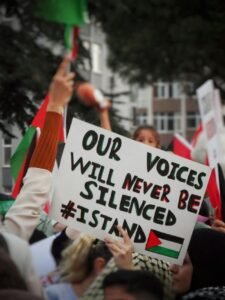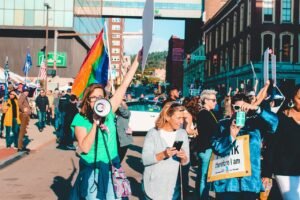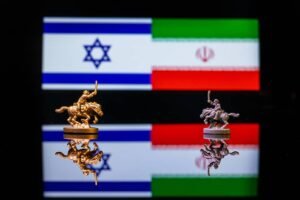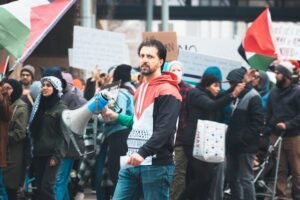This report examines whether the Gaza War has triggered a significant shift towards greater openness in public discourse within Egypt, exploring recent protests at the Journalists Syndicate and the role of women activists in leading these demonstrations. Since 2013, the Egyptian authorities have begun to activate a more restrictive system, succeeding in suppressing protests in Egypt, relying on Law No. 107 of 2013 (the Protest Law) which was passed in 2013 following the events of June 30. Limited protests have returned to the streets of Cairo in condemnation of the ongoing genocide committed by the Israeli occupation against Palestinians in the besieged Gaza Strip. These protests were led by politicians, activists, and members of professional unions to break the state of closure imposed on the public sphere by the Egyptian regime for several years until now.
The “Land Friday” protests witnessed in Cairo in 2016, objecting to Egyptian President Abdel Fattah el-Sisi’s relinquishment of the islands of Tiran and Sanafir to Saudi Arabia, were the last mass protests that led to the arrest of dozens of participants. They were prosecuted for refusing to sell their land. Since then, protests in the streets of Cairo have receded and almost disappeared, while supporters of President Abdel Fattah el-Sisi have been allowed to be present in the streets and squares on several occasions. However, in September 2020, protests returned for several days in the form of a popular uprising against the high cost of living and the deterioration of economic conditions, famously known as the “Mohammed Ali calls”.
The Law Regulating Demonstrations, also known as the “Law Regulating the Right to Public Meetings, Processions, and Peaceful Demonstrations,” issued by interim President Adly Mansour in 2013, has limited citizens’ ability to protest either by restricting the freedom of assembly or through broad definitions of terrorism, sabotage, or incitement to violence.
EFFORTS TO RECLAIM… WOMEN LEAD THE WAY
After years of absence of oppositional women’s protest scenes, dozens of activists organized a surprise march starting from the headquarters of the Palestinian Women’s Union in the Ramses area of Cairo. However, they were surrounded by security forces, and the participants were forced to end the activity before reaching Tahrir Square in the centre of the capital. This march was held on the occasion of International Women’s Day to demand the entry of aid into the Gaza Strip and to stop the Israeli occupation’s aggression against the sector.
The march was attended by several female politicians, rights activists, and journalists, including Aida Seif Elldawla, the director of the Nadim Center, who stated to Zawia3: “The march is part of several ongoing attempts since 2014, which are often weak but persistently strive. We cannot exclude from these attempts the struggles of the people of Warraq Island, the residents of the Gamalaya suburb, the people of Rafah and Sheikh Zuwaid, labor strikes, and attempts to show solidarity with our people in Gaza, of which the March 8th march was one of its forms.”
Seif Elldawla continued: “I believe these attempts will continue because this level of political repression and impoverishment of the majority of citizens cannot continue without a reaction in the public sphere.” She pointed out that these reactions confirm that injustice is unacceptable and refute the idea that Egyptians are submissive people susceptible to humiliation. However, she believes that these attempts are scattered and lack mechanisms of solidarity among them. She indicated that anger is simmering beneath the surface, and the authority in Egypt seems indifferent to satisfying the citizens, even minimally in terms of livelihood.
On the other hand, Ilham Eidarous, co-founder of the Bread and Freedom Party and one of the participants in the women’s march, believes that the Palestinian issue has been and will remain central to Egyptian politics and is linked to many aspects such as the level of democracy, human rights conditions, foreign policies, and so forth. This issue reflects the political situation, especially the democratic aspect.
She added: “For years, the Egyptian regime has restricted the right to peaceful assembly. With the Israeli forces waging war on the Gaza Strip, attempts by various democratic groups to overcome the regime’s crackdown, such as the protests of Al-Azhar and the march that started from there and reached Tahrir Square, and the sudden women’s march and the Ministry of Foreign Affairs, have been met with severe security repression, as evidenced by the continued detention of the youth arrested in the October protests. Yet, there are attempts to regain spaces that cannot be said to be significant but are ongoing.”
The co-founder of the Bread and Freedom Party described the situation in Egypt as shameful. She pointed out that while millions of people around the world came out in support of the people of the Gaza Strip, activism in Egypt is constrained and prohibited. Despite attempts to protest and launch supportive activities for the Palestinian people, she believes that the movements still do not rise to the level of the event. She says: “One of the positives that emerged during the recent period is the return of the roots of the Arab-Israeli conflict and the position on Camp David to the discussion table, whether among politicians or ordinary citizens.”
On October 20th last year, protests erupted from several squares as part of the official lawsuit launched by Sisi to reject the idea of displacing and resettling Palestinians in Sinai. However, this political cover from the regime did not prevent the security agencies from cracking down on some participants, especially those who exceeded the list of gathering places mobilized by parties loyal to the authorities, and decided to leave Al-Azhar in a march that included tens of thousands to Tahrir Square, in a scene that had not been repeated since the January revolution before the security forces decided to disperse it and arrest some participants.
AFTER ABSENCE, PROTESTS RETURN TO THE JOURNALISTS SYNDICATE
The chants once again echoed on the stairs of the Journalists Syndicate after years of hiatus, as the syndicate council and members of the general assembly organized several solidarity protests with the Palestinian people since mid-October last year. This implicitly indicates the restoration of the Journalists Syndicate staircase, which has witnessed numerous protests since the era of former President Hosni Mubarak before this space was closed following the incident of storming the Journalists Syndicate by security forces in 2016 and the arrest of journalists (Amr Badr – editor-in-chief of the January Gate at the time – and Mahmoud El-Sakka, a journalist at Al-Mansha), charged with spreading false news in a precedent.
The “Bread and Salt” events organized by journalist members of the general assembly and held every Tuesday on the Journalists Syndicate staircase during the month of Ramadan are one of the protest events witnessed by the Journalists Syndicate in solidarity with the besieged Palestinian people.
On her part, journalist Iman Aouf, one of the founders of the Egyptian Female Journalists Initiative, which adopted many activities on the Journalists Syndicate staircase, condemns the Egyptian regime’s handling of protests in support of the Palestinian people, the arrest of some, and their continued detention since October until now. She points out that Egypt was the first country to support Palestine as it was in the past, but what is happening is a call for formal, manufactured protests that do not reflect the anger of Egyptians. When they decided to express their anger, the response was prevention and arrest, as a result of the authorities’ fear of the return of the masses and protests to the streets.
Aouf explains that the Egyptian regime fears the emergence of genuine, massive protests, even if they are in support of Gaza. The regime’s fear is linked to economic policies and the impoverishment plan pursued by the state, fearing that protests in support of Palestine may turn into protests against poverty, hunger, and lack of freedoms.
Regarding the protests called for by a group of Egyptian female journalists on the Journalists Syndicate staircase, she says: “Egyptian female journalists, a group of members of the Journalists Syndicate, we have clear positions on the practices of the Egyptian regime, whether suppressing freedoms practised against journalists or citizens, and we have positions related to economic and social policies practiced by the regime against the Egyptian people.” She adds that there are significant intersections between their group’s issues, particularly defending journalists and their conditions, and what is happening externally. She describes: “We cannot be a group that defends journalists in Egypt and does not rise up for 136 Palestinian journalists who were martyred after being killed by occupation forces, alongside the families of journalists deliberately targeted. If we are talking about professional issues and defending them, it is not right not to take a stance regarding what is happening to Palestinian journalists.” On the other hand, the group also has a feminist vision that intersects with the violations against women in Gaza.
Regarding the state of the public sphere in Egypt, the Cairo Center for Human Rights Studies issued a research paper in March of last year titled “The Dilemma of Opening the Public Sphere in Egypt,” mentioning that there are three factors that may compel the Egyptian authorities, in light of the current economic downturn, to expand the space of the public sphere. The third factor represents the escalation of spontaneous, unorganized popular protests under the pressure of living difficulties. According to human rights reports, labor sectors in factories and companies, whether in the public or private sector in several Egyptian cities, witness high rates of protests and strikes to demand wage increases and the disbursement of incentives to cope with the rising cost of living. The continuity of these protests and their expansion in society may lead to their transformation in the coming months into a political act representing real pressure on the authority.
A FRUSTRATING ROLE PLAY
On March 18th, a number of public figures staged a protest in front of the Ministry of Foreign Affairs to demand the allowance of a humanitarian convoy accompanying aid in an attempt to break the siege on Gaza. The decision for the protest came after the Ministry of Foreign Affairs postponed the scheduled meeting on Monday, March 11th, between one of its ambassadors involved in the Palestinian file and a delegation from the campaign that had previously submitted a statement signed by Egyptian and Arab figures demanding entry into Gaza with aid, sparking escalating criticism towards the government’s handling of the ongoing war.
In the same context, Aida Seif Elldawla sees the performance of the Egyptian authority as disgraceful. Starting from the speech in which the president announced his rejection of the displacement of Palestinians to Sinai, but also “suggested relocating them to the Negev Desert until the occupation completes its declared mission.” She points out that the Egyptian president’s stance on rejecting displacement is correct and has been welcomed by civil society, but she criticizes him for not taking action to protect them from killing, starvation, or death due to medical neglect. She condemns the continuation of diplomatic relations between the two countries by the Egyptian authority and the failure to withdraw Cairo’s ambassador from Tel Aviv or expel the Israeli ambassador from Egypt, despite demands to do so.
LIMITED ATTEMPTS AMID OPPOSITION DECLINE
Researcher and politician Zohdy Alshamy, deputy leader of the Socialist Popular Alliance Party, commends the efforts made by some to reopen the public sphere after years of Egyptian authorities monopolizing it. However, he views these attempts as still limited compared to the Israeli aggression now in its sixth month.
He believes that the solidarity protests in Egypt are disproportionate to the scale of the event compared to the global activism, attributing this to security constraints. He adds, “Even in the beginning, when the state itself adopted the idea of supporting the president’s decisions in the face of war and the supporters of the state descended to Tahrir Square attempting to enter it, it ended with the arrest of a group of citizens who are still in pretrial detention.”
The deputy leader of the Socialist Popular Alliance Party explains that the state has fears of linking the aggression on Palestine with the crisis in Egypt due to deteriorating economic conditions and decisions. So far, the authority’s response to the protest movements has been negative. He reveals that the Egyptian opposition has been experiencing a state of significant weakness and confusion since before the aggression on Gaza, and after the war, the crisis deepened, and the scene became more confusing. He recalls, “There was hope for a breakthrough with the start of national dialogue sessions, but this has not happened yet.”
In the same context, journalist Eman Awuf returns to the discussion, criticizing the state of the opposition in Egypt, describing it as “living in a state of disintegration.” She adds, “There is no partisan or institutional work, as a result of the harassment that the opposition has been subjected to over the past years since 2014, which has affected its role in supporting the Palestinian cause due to threats and the closure of the public sphere, reflecting the deterioration we have reached.” She condemns the state of surrender that the opposition is experiencing. She sees that during the era of former President Hosni Mubarak in 2008, the political conditions were similar, but the Palestinian issue remained a priority for the Egyptian opposition. In the past, Palestine was able to unite the Egyptian opposition, but now the opposition is fragmented, with some seeking direct interests with the regime, some fearing support for resistance as it is perceived as Islamist, and some fear breaking the constraints and boundaries to avoid the regime’s repression.
In a report by Amnesty International on the situation in Egypt during the years 2022/2023, it stated that the Egyptian authorities severely suppressed the right to freedom of expression, association, and peaceful assembly. In the period preceding the United Nations Climate Change Conference (COP 27) in Sharm El-Sheikh on the Red Sea coast, the authorities released 895 prisoners held for political reasons, but they arrested about three times that number in connection with calls to protest during the climate conference. Thousands of critics or actual or alleged government opponents remained arbitrarily detained or subjected to unfair trials.
The organization also pointed out that the Egyptian authorities suppressed the right to strike, failed to protect workers from arbitrary dismissal by companies, forcibly evicted slum dwellers, and detained them for protesting against the demolition of their homes. The authorities prosecuted Christians demanding their right to worship, as well as others who adhere to religious beliefs not recognized by the state. Refugees and migrants were arbitrarily detained for entering or staying in Egypt irregularly, and dozens were forcibly returned to their countries of origin. This has become the general scene produced by the Egyptian authorities, insisting on its completion despite local and international attempts to push for the opening of the public sphere and strengthen the democratic state.
First published in March 2023 at Zawia3 Platform.
All rights are reserved.









